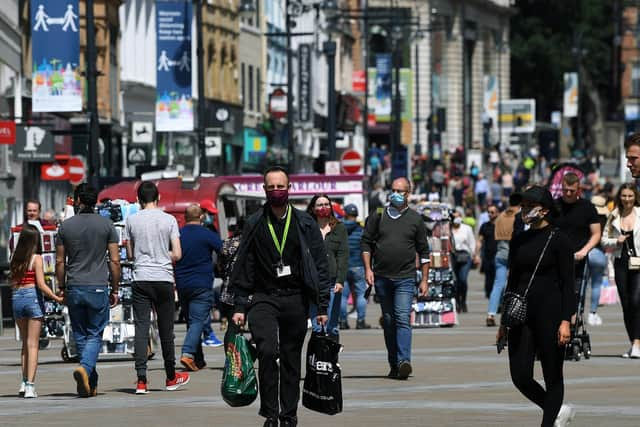Why Yorkshire's high streets could soon have fewer shops but more destinations
One leading academic described how the coronavirus crisis accelerated many pre-existing problems for the high street "and has spread like a forest fire through the retail sector", meaning a decline that could have taken five years has been condensed into a matter of months.
Debenhams and Arcadia Group collapsed this week, putting 25,000 jobs at risk, while earlier in the year well-known high street brands like DW Sports, TM Lewin and Monsoon ran into trouble.
Advertisement
Hide AdAdvertisement
Hide AdHe said: “The North of England has been particularly badly hit, especially cities such as Leeds and Sheffield, as they were already suffering from decades of under-investment.
“Emporia are only going to work if they are seen as a true destination to go shopping in, such as Harrods, Fortnum and Mason and Selfridges. The paler imitations, such as Debenhams and even John Lewis, have been forced to close stores and dramatically scale down their operations.
“The pandemic has led to a reset button being pressed in many ways, but it will be interesting to see if people’s shopping habits have changed permanently.
“What is needed in the future is clear leadership on a local level, to bring investment into town and city centres and ensure they have a viable future.


Advertisement
Hide AdAdvertisement
Hide Ad“There is a lot of talk about making them destinations that people will want to travel to, with a far wider offering than simply just retail. But that is the challenge, especially at a time when there is so little money available due to the coronavirus crisis.”
Stephen Bethal of the British Retail Consortium said the nation had been "heading towards a future of fewer stores and fewer shops than we used to have". But he said: "That shouldn't mean the death of the high street, high streets are more than just places with shops in them."
Social distancing restrictions and the rise in home working have led to a huge drop in the numbers of visitors to city centres, with footfall in Leeds reaching just 40 per cent of pre-pandemic levels during the summer.
And after a month of lockdown, there are fears for the future of many retailers if they don't have a good enough Christmas to sustain themselves into 2021.
Advertisement
Hide AdAdvertisement
Hide AdOlga Munroe, Head of Retail Institute at Leeds Beckett University, said this trend of declining footfall in cities was likely to continue after the pandemic. But she sounded a more optimistic note, suggesting the loss of major chains could lead to a more diverse range of brands.
"Recessions are really a natural part of the capitalistic cycle. So, there is a period of recession that normally lasts between a year and a year and a half, we've seen that in 2008-2009, but it's worth remembering at this time it's only temporary.
"So this is very kind of normal to happen and even though I know nothing about the Covid situation is normal, we're going to perhaps see a rebirth of maybe more exciting High Street, with a different mix with a different mix of retail offer between leisure entertainment, and traditional retail shopping.
"What I would say as a positive out of all this is that the periods of expansion when you look at the recession, the periods of expansion of the market are much longer than the periods of recession. So we just need to bear in mind it will be probably very tough, but it's going to be a temporary situation."
Advertisement
Hide AdAdvertisement
Hide AdCivic and business leaders in many parts of Yorkshire have responded to challenges facing high streets by trying to provide a distinct offer in town and city centres.
Central government projects have helped with this, with the controversial Towns Fund project handing out up to £25m to areas around the country for regeneration works.
The Future High Streets Fund is providing up to £55m for the regeneration of heritage high streets and a High Streets Task Force has been set up, giving high streets and town centres expert advice to adapt and thrive.
The Government says this will provide "hands-on support to local areas to develop data-driven innovative strategies and connect local areas to relevant experts".
Comment Guidelines
National World encourages reader discussion on our stories. User feedback, insights and back-and-forth exchanges add a rich layer of context to reporting. Please review our Community Guidelines before commenting.